The Sand War of 1963: A Brief Conflict with Long Shadows
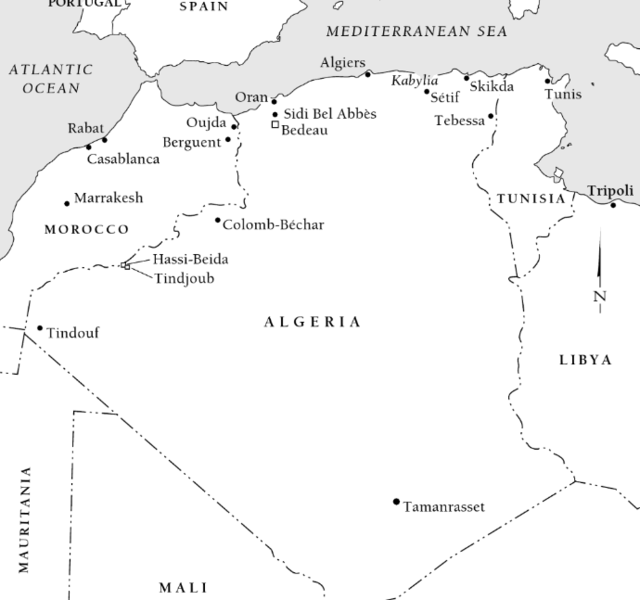
By Mehdi El Merini / Arab America Contributing Writer
The Sand War, a brief yet impactful clash between Morocco and Algeria, unfolded in the fall of 1963. Occurring just a year after Algeria’s hard-won independence from French colonial rule, the Sand War revolved around territorial disputes inherited from colonial-era borderlines. Though lasting only a few months, the conflict underscored the complexities of decolonization in North Africa, where new borders often failed to align with historical claims and tribal connections. Cuba’s alignment and subsequent support to Algeria at the time, also highlighted the importance of revolutionary movements during the Cold War. The Sand War remains a testament to the challenges faced by emerging nations in reconciling historical boundaries with newly drawn borders.
The Roots of Dispute: Colonial Boundaries and Historic Claims
The Sand War’s origins lie primarily in the colonial borders established by France in the 19th and 20th centuries. During this period, both Algeria and Morocco came under French control: Morocco as a protectorate from 1912 to 1956, and Algeria as a colony integrated into metropolitan France from 1830 until 1962. Under French rule, Algeria’s borders were expanded into areas that historically fell under Moroccan influence. These changes particularly affected sparsely populated desert regions, including the areas around Tindouf and Béchar, which became central to the later dispute.
When Morocco gained independence in 1956, King Mohammed V sought to reclaim territories he believed had traditionally been part of Morocco, citing historic ties to the desert lands. Yet the boundaries established during the colonial period remained intact as Algeria continued its fight for independence from France. Throughout the struggle, Morocco offered moral support to Algeria’s National Liberation Front (FLN) in the fight against French colonial forces. Despite this support, as soon as Algeria secured its independence in 1962, the territorial question came to the fore. Both nations aspired to sovereignty over the disputed areas, setting the stage for conflict.
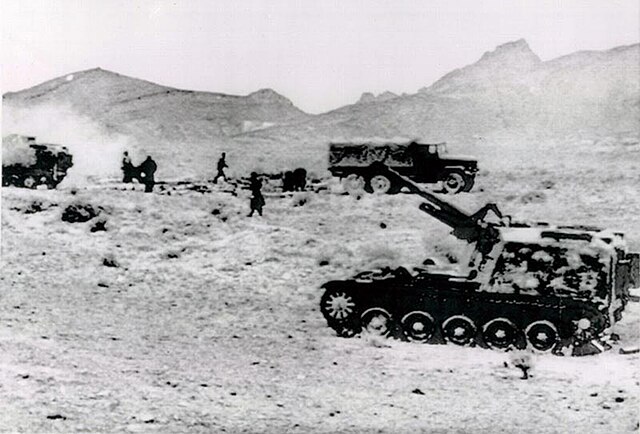
Morocco’s Claims and Algeria’s Response
King Hassan II, who succeeded his father, Mohammed V, in 1961, was determined to pursue Morocco’s claims over the disputed areas. He argued that the newly independent Algeria should respect Morocco’s historical claims, particularly in regions such as Tindouf and Béchar. Algeria’s leaders, on the other hand, insisted that the territorial integrity established under French colonial rule should be upheld as the recognized international boundary.
The disputed areas were not only symbolic of national sovereignty but also potentially valuable, with natural resources such as iron ore and oil. Although the land itself was vast and sparsely populated, the mineral wealth in certain regions increased its importance for both countries, who sought to build strong, independent economies. This tension between territorial rights and resource access fueled the conflict further.
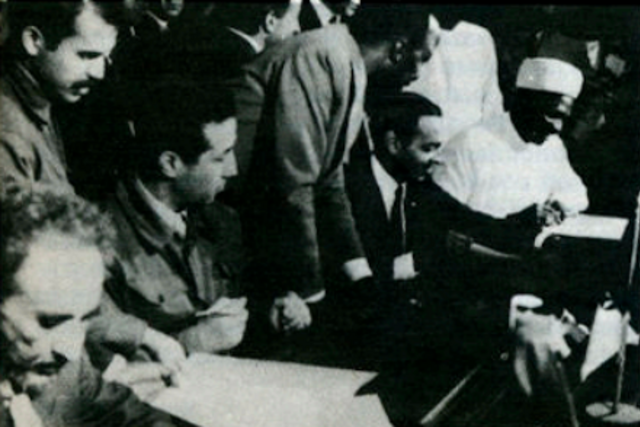
Rising Tensions and the Move Toward Conflict
In early 1963, diplomatic efforts to resolve the border issue through negotiation failed. Both nations stood firm, and tensions began to escalate. By October 1963, the situation had reached a critical point, with skirmishes breaking out along the border. Armed clashes occurred near the villages of Hassi Beida and Tindouf, marking the onset of what would become known as the Sand War.
Neither Morocco nor Algeria had a fully established military at the time, as both were young nations still consolidating their state institutions. However, Moroccan forces moved into the disputed areas, and Algeria responded with defensive maneuvers. The fighting intensified in October as both nations sought to assert control over the borderlands. Although the skirmishes were limited in scale, the conflict stirred nationalist sentiments on both sides.
Cuba’s involvement in the Sand War of 1963, though often overlooked, marked an early example of its support for revolutionary movements and newly independent nations. Under the leadership of Fidel Castro, Cuba aligned itself with Algeria, viewing the socialist government of President Ahmed Ben Bella as a fellow revolutionary regime in the global struggle against colonialism and imperialism. In a gesture of solidarity, Cuba sent a small contingent of troops and military advisors to Algeria during the conflict, though their direct involvement in combat was limited. This support reflected Cuba’s broader strategy of extending influence in the developing world by assisting post-colonial states, particularly those with socialist leanings. Cuba’s participation in the Sand War not only solidified its alliance with Algeria but also underscored the broader Cold War dynamics that often played out in regional conflicts across the Global South.
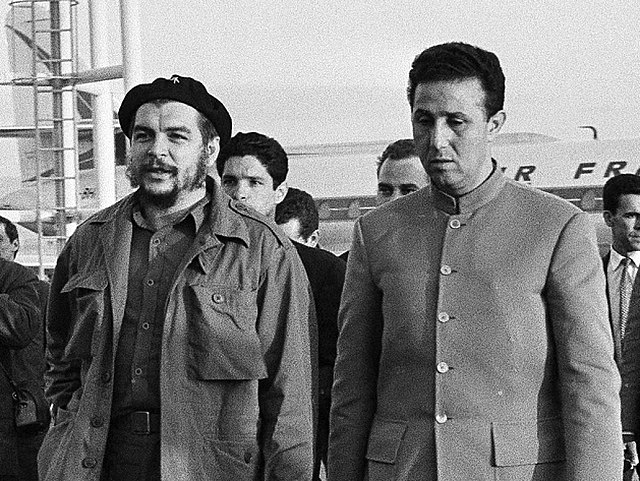
The International Response
The Sand War drew the attention of other nations in the Arab world, as well as the newly formed Organization of African Unity (OAU), which was concerned with promoting peace and unity across Africa. Leaders of neighboring countries, including Egypt’s President Gamal Abdel Nasser and Mali’s President Modibo Keita, worked to mediate between Morocco and Algeria. Given the recent memory of colonialism and the commitment to avoiding fraternal conflicts, regional leaders saw the Sand War as an urgent issue to address, fearing that an extended conflict could weaken North Africa’s position on the global stage.
Through diplomatic efforts, the two sides agreed to a ceasefire on October 30, 1963. This ceasefire was brokered with the help of the OAU and further supported by other African and Arab states who were committed to defusing tensions between Algeria and Morocco. An agreement brought by a Malian officer was subsequently signed in February 1964, formalizing the end of hostilities. Although the border issue was not fully resolved, both nations agreed to pursue further negotiations in the hopes of reaching a lasting settlement.
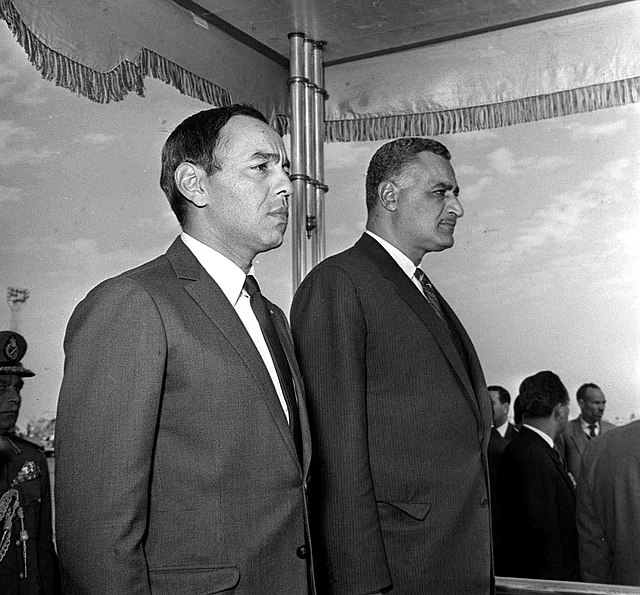
Aftermath of the Sand War
While the Sand War was brief, the conflict revealed the difficulties North African states faced in reconciling historical claims with colonial borders. In many ways, it highlighted the challenge of building post-colonial nations with borders drawn by former colonial powers without input from local communities. Although a formal treaty was signed in 1972, the Sand War and its associated border dispute have left a lasting mark on Moroccan-Algerian relations, underscoring the complexity of decolonization in the region.
In the immediate aftermath of the Sand War, both Morocco and Algeria focused on strengthening their respective states and ensuring security along their shared border. For Morocco, the conflict reaffirmed the need to balance historical claims with respect for international norms, while Algeria was reminded of the challenges of maintaining its territorial integrity after decades of colonial manipulation of its borders.
Ultimately, the Sand War of 1963 stands as a brief yet revealing episode in North African history. Its origins, rooted in the legacy of colonialism, highlight the difficulties of reconciling historical claims with political realities in a newly decolonized world. The conflict serves as a reminder of the resilience of both nations and the efforts made by regional leaders to promote peace in a period of significant upheaval and change. As such, the Sand War is not only a chapter in Moroccan-Algerian relations but also part of a broader story of decolonization and the quest for stability in post-colonial Africa.
Check out our blog here!








